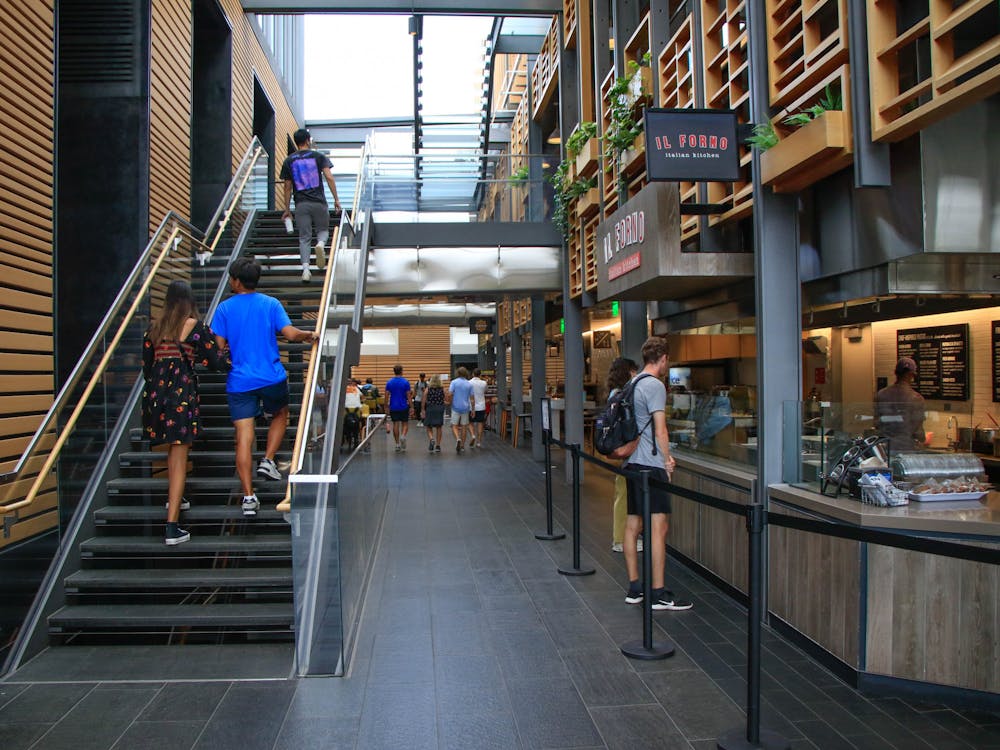In response to student complaints about Daily Devil Deals’ smaller serving sizes, Duke Dining administrators say that Daily Devil Deals are not intended to serve as full meals.
The Duke University Student Dining Advisory Committee, a student organization representing student interests in decisions made by Duke Dining, also discussed food prices and new budgeting email reminders during their Monday meeting.
Students say Daily Devil Deals are smaller than usual
DUSDAC President Aidan Galdea, a senior, brought forth complaints from students who reported that they noticed a decrease in Daily Devil Deals’ serving sizes although prices had not changed since the beginning of the semester. Daily Devil Deals are small portions that cost $5 or less and are available at vendors across campus.
Robert Coffey, executive director of Duke Dining, did not point to any specific policies regarding Daily Devil Deal food quantities.
”The $5 deal is not meant to be a meal, it’s meant to be more than a snack,” said Grayson Crabtree, program director of Duke Dining.
Galdea pointed to the rising cost of full meals as having pushed students to rely on the $5 deal as a full meal.
“People are [saying] their friends aren’t eating enough because they're only eating $5 deals because they're trying to budget,” Galdea said. He thought changing the “conception in the student body” of the $5 deal as a meal is important.
Prices will not further increase through semester
Galdea asked Coffey who controls food prices on campus and how price change decisions are made.
“Through our contracts, which are more than 50+ contracts, Duke Dining has the ultimate say [on prices],” Coffey said. “That boils down to Aris [Marton] and myself reviewing the information they put forth, verifying, getting back to them, approving or not approving the prices.” Aris Marton is DUSDAC’s advisor.
According to Coffey, food prices will not change throughout the semester after they were approved to be higher than usual before the semester began due to inflation.
“The prices that were put in, that were approved, should be in place for the semester…we've actually had some prices reduced. But we have not approved any [prices] to increase,” he said.
If prices were to change at vending locations on campus during the semester, Duke Dining would investigate, according to Coffey.
‘Targeted emails’ will remind students to budget food points
Duke Dining completed a recent analysis on the first four weeks of spending and will begin sending students targeted budgeting email reminders, according to Coffey.
About 80% of the upperclass meal plans analyzed are “on target for their spending,” according to Coffey.
“In the other 20%, nobody is really off the rails yet,” Coffey said.
For the first-year meal plan, about 70% of first year students are on-track with their spending.
“I’ve got a feeling that they're not utilizing these [Marketplace] swipes like they should be,” Coffey said.
Coffey said that Duke Dining will monitor spending more closely this year and send “targeted emails” reminding them to keep their spending within their food plans.
Get The Chronicle straight to your inbox
Signup for our weekly newsletter. Cancel at any time.

Vishal Jammulapati is a Trinity sophomore and an associate news editor of The Chronicle's 118th volume.

